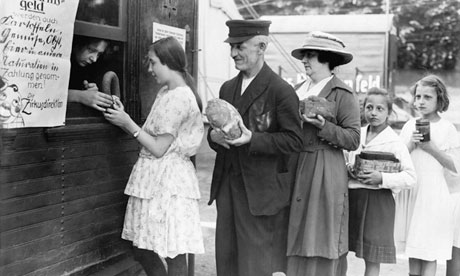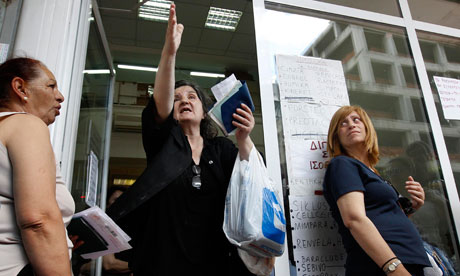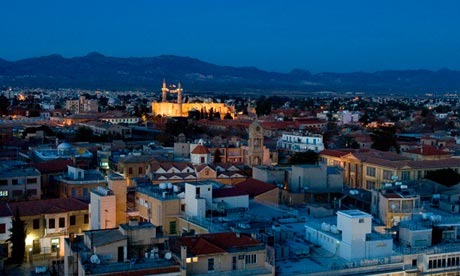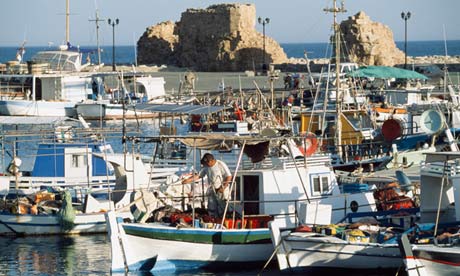Nick Dearden guardian.co.uk, Wednesday 27 February 2013 12.24 GMT
Sixty years ago, half of German war debts were cancelled to build its economy. Yet today, debt is destroying those creditors
People exchanging food for tickets in 1923 Germany. 'Many, including Keynes, argued that [reparations imposed on Germany following the Versailles treaty] led to the rise of the Nazis and the second world war.' Photograph: Keystone/Corbis
Sixty years ago today, an agreement was reached in London to cancel half of postwar Germany's debt. That cancellation, and the way it was done, was vital to the reconstruction of Europe from war. It stands in marked contrast to the suffering being inflicted on European people today in the name of debt.
Germany emerged from the second world war still owing debt that originated with the first world war: the reparations imposed on the country following the Versailles peace conference in 1919. Many, including John Maynard Keynes, argued that these unpayable debts and the economic policies they entailed led to the rise of the Nazis and the second world war.
By 1953, Germany also had debts based on reconstruction loans made immediately after the end of the second world war. Germany's creditors included Greece and Spain, Pakistan and Egypt, as well as the US, UK and France.
German debts were well below the levels seen in Greece, Ireland, Portugal and Spain today, making up around a quarter of national income. But even at this level, there was serious concern that debt payments would use up precious foreign currency earnings and endanger reconstruction.
Needing a strong West Germany as a bulwark against communism, the country's creditors came together in London and showed that they understood how you help a country that you want to recover from devastation. It showed they also understood that debt can never be seen as the responsibility of the debtor alone. Countries such as Greece willingly took part in a deal to help create a stable and prosperous western Europe, despite the war crimes that German occupiers had inflicted just a few years before.
The debt cancellation for Germany was swift, taking place in advance of an actual crisis. Germany was given large cancellation of 50% of its debt. The deal covered all debts, including those owed by the private sector and even individuals. It also covered all creditors. No one was allowed to "hold out" and extract greater profits than anyone else. Any problems would be dealt with by negotiations between equals rather than through sanctions or the imposition of undemocratic policies.
Perhaps the most innovative feature of the London agreement was a clause that said West Germany should only pay for debts out of its trade surplus, and any repayments were limited to 3% of exports earnings every year. This meant those countries that were owed debt had to buy West German exports in order to be paid. It meant West Germany would only pay from genuine earnings, without recourse to new loans. And it meant Germany's creditors had an interest in the country growing and its economy thriving.
Following the London deal, West Germany experienced an "economic miracle", with the debt problem resolved and years of economic growth. The medicine doled out to heavily indebted countries over the last 30 years could not be more different. Instead, the practice since the early 1980s has been to bail out reckless lenders through giving new loans, while forcing governments to implement austerity and free-market liberalisation to become "more competitive".
As a result of this, from Latin America and Africa in the 80s and 90s to Greece, Ireland and Spain today, poverty has increased and inequality soared. In Africa in the 80s and 90s, the number of people living in extreme poverty increased by 125 million, while economies shrank. In Greece today, the economy has shrunk by more than 20%, while one in two young people are unemployed. In both cases, debt ballooned.
The priority of an indebted government today is to repay its debts, whatever the amount of the budget these repayments consume. In contrast to the 3% limit on German debt payments, today the IMF and World Bank regard debt payments of up to 15-25% of export revenues as being "sustainable" for impoverished countries. The Greek government's foreign debt payments are around 30% of exports.
When debts have been "restructured", they are only a portion of the total debts owed, with only willing creditors participating. In 2012, only Greece's private creditors had debt reduced. Creditors that held British or Swiss law debt were also able to "hold out" against the restructuring, and will doubtless pursue Greece for many years to come.
The "strategy" in Greece, Ireland, Portugal and Spain today is to put the burden of adjustment solely on the debtor country to make its economy more competitive through mass unemployment and wage cuts. But without creditors like Germany willing to buy more of their exports, this will not happen, bringing pain without end.
The German debt deal was a key element of recovering from the devastation of the second world war. In Europe today, debt is tearing up the social fabric. Outside Europe, heavily indebted countries are still treated to a package of austerity and "restructuring" measures. Pakistan, the Philippines, El Salvador and Jamaica are all spending between 10 and 20% of export revenues on government foreign debt payments, and this doesn't include debt payments by the private sector.
If we had no evidence of how to solve a debt crisis equitably, we could perhaps regard the policies of Europe's leaders as misguided. But we have the positive example of Germany 60 years ago, and the devastating example of the Latin American debt crisis 30 years ago. The actions of Europe's leaders are nothing short of criminal.
![The [Greek] European Tragedy](https://blogger.googleusercontent.com/img/b/R29vZ2xl/AVvXsEiWKI5s90SFm1wWTk6bs4p7CgslaC2SnYPsrZhb-B-smOufNNCSxCvpBLI9hOB-LsXZjir_PNmEiMk2-E62F3xkg96IoC6QFAaZAnPRTVH340IN9WBRmWJqPkjWlgyRj3zpALp7h6hvA58/s920/GkBack_new.jpg)













 Being on the verge of bankruptcy, one would expect that Greeceʼs politicians would propose some serious reforms aiming at controlling and alleviating the countryʼs huge financial burden. Furthermore, one would also expect from the greek voters to exhibit some sort of determination to press for changes that are indispensible if this country is to be rescued from an unprecedented state of turmoil that is threatening to take place sooner than most people would expect.
Being on the verge of bankruptcy, one would expect that Greeceʼs politicians would propose some serious reforms aiming at controlling and alleviating the countryʼs huge financial burden. Furthermore, one would also expect from the greek voters to exhibit some sort of determination to press for changes that are indispensible if this country is to be rescued from an unprecedented state of turmoil that is threatening to take place sooner than most people would expect.  “In Greece, the real power is the power of resistance, the power of inertia”, said a former politician who received the hostility of the people for daring to suggest some innovations. Greeceʼs main power centers (political parties, professional guilds, public sector unions, business leaders, and the media moguls) have never stopped fighting against every attempt to reform the country because they want to preserve their privileges. They show an extreme determination to block any structural changes that would help the economy be more functional. With corruption being woven into the fabric of the greek state, any reforms seem like “mission impossible”.
“In Greece, the real power is the power of resistance, the power of inertia”, said a former politician who received the hostility of the people for daring to suggest some innovations. Greeceʼs main power centers (political parties, professional guilds, public sector unions, business leaders, and the media moguls) have never stopped fighting against every attempt to reform the country because they want to preserve their privileges. They show an extreme determination to block any structural changes that would help the economy be more functional. With corruption being woven into the fabric of the greek state, any reforms seem like “mission impossible”. Besides being unwilling to work hard and serve the citizens, most public servants “invented” numerous ways of making an extra buck. They directly or indirectly received smaller or larger bribes (depending on the case) to process a civilianʼs request. The practice of “feathering their own beds” has not decreased a bit even now where the whole country is collapsing. In the past, most civil servants were handsomely paid by the state by receiving financial “allowances” that were “tailor made” by the politicians who appointed them just to keep their voters happy. Since most of the money that the country borrows is headed towards the payment of the public servants, it is rather obvious that the only means of rescuing Greece from a complete state of disaster is simply to fire at least half of the public servants.
Besides being unwilling to work hard and serve the citizens, most public servants “invented” numerous ways of making an extra buck. They directly or indirectly received smaller or larger bribes (depending on the case) to process a civilianʼs request. The practice of “feathering their own beds” has not decreased a bit even now where the whole country is collapsing. In the past, most civil servants were handsomely paid by the state by receiving financial “allowances” that were “tailor made” by the politicians who appointed them just to keep their voters happy. Since most of the money that the country borrows is headed towards the payment of the public servants, it is rather obvious that the only means of rescuing Greece from a complete state of disaster is simply to fire at least half of the public servants. The state surely needs to be substantially decreased by entering the phase of a healthy privatization process. Many counterproductive and heavily bureaucratic agencies should be sold to the private sector. In addition, numerous public agencies that were formed to house counterproductive public servants and have no actual role to play in terms of serving the public should be immediately abolished. Otherwise, no matter how many loans Greece gets, the end result will be always the same.
The state surely needs to be substantially decreased by entering the phase of a healthy privatization process. Many counterproductive and heavily bureaucratic agencies should be sold to the private sector. In addition, numerous public agencies that were formed to house counterproductive public servants and have no actual role to play in terms of serving the public should be immediately abolished. Otherwise, no matter how many loans Greece gets, the end result will be always the same.  The countryʼs tax collecting mechanism also needs some heavy reforms. Greece has 286 tax offices a huge per capita figure by OECD standards, created in the past two decades to serve the voting clientele. During the 80ʼs the 90ʼs and right after 2007 many civil servants were transferred to tax collection departments from other parts of the civil service without having the necessary skills or training. Why? Because being in charge of collecting taxes allows every public servant to benefit himself by receiving kickbacks. As long as no reforms take place, the ones who undertake the burden of paying taxes are the pensioners, the low salary earners and the small-medium size businesses many of which are forced to abandon Greece to avoid the heavy tax burden. Big businesses which have strong political connections end up paying very little simply because they finance the political campaigns of the corrupted political parties.
The countryʼs tax collecting mechanism also needs some heavy reforms. Greece has 286 tax offices a huge per capita figure by OECD standards, created in the past two decades to serve the voting clientele. During the 80ʼs the 90ʼs and right after 2007 many civil servants were transferred to tax collection departments from other parts of the civil service without having the necessary skills or training. Why? Because being in charge of collecting taxes allows every public servant to benefit himself by receiving kickbacks. As long as no reforms take place, the ones who undertake the burden of paying taxes are the pensioners, the low salary earners and the small-medium size businesses many of which are forced to abandon Greece to avoid the heavy tax burden. Big businesses which have strong political connections end up paying very little simply because they finance the political campaigns of the corrupted political parties.  Unfortunately, Greeceʼs private sector is collapsing due to heavy taxation and bureaucracy. The private sector is sacrificed just to rescue the state mandarins. The only surviving private businesses are the ones which had unethically and illegally interlaced with the corrupted public sector.
Unfortunately, Greeceʼs private sector is collapsing due to heavy taxation and bureaucracy. The private sector is sacrificed just to rescue the state mandarins. The only surviving private businesses are the ones which had unethically and illegally interlaced with the corrupted public sector.  Instead of forcing those individuals to leave the country, the country of Greece could provide them with all the necessary travelling documents that would enable the immigrants to go to other european countries. That would be perhaps one of the biggest nightmares of Berlin, but it could teach Europe a useful lesson for not implementing a solid based and realistic immigration policy.
Instead of forcing those individuals to leave the country, the country of Greece could provide them with all the necessary travelling documents that would enable the immigrants to go to other european countries. That would be perhaps one of the biggest nightmares of Berlin, but it could teach Europe a useful lesson for not implementing a solid based and realistic immigration policy. Terms like the “Great Albania”, “Great Bulgaria”, “Great Serbia”, “the “Great Macedonia” (one of the most successful historical jokes that started in Titoʼs times by Tito himself) are an inseparable part of the Balkan mentality which has also been infested by theocracy. Instead of getting rid of their corrupted politicians and find a formula of cooperating among themselves so as to improve their economies, the balkan states exhaust themselves in their attempt to be linked to Alexander the Great. Neither Alexander nor his ancient macedonians exist today. Nobody in the Balkans can claim that he is genetically linked to them after so many intermixtures of tribes that took place there. It would be a great joke if somebody truly claimed that he is a direct and pure descendant of Alexander.
Terms like the “Great Albania”, “Great Bulgaria”, “Great Serbia”, “the “Great Macedonia” (one of the most successful historical jokes that started in Titoʼs times by Tito himself) are an inseparable part of the Balkan mentality which has also been infested by theocracy. Instead of getting rid of their corrupted politicians and find a formula of cooperating among themselves so as to improve their economies, the balkan states exhaust themselves in their attempt to be linked to Alexander the Great. Neither Alexander nor his ancient macedonians exist today. Nobody in the Balkans can claim that he is genetically linked to them after so many intermixtures of tribes that took place there. It would be a great joke if somebody truly claimed that he is a direct and pure descendant of Alexander.  The lack of european leadership
The lack of european leadership


